Explorers #1: a look back at the story of an African journey from Mozambique to Rwanda
Foundation

As part of this "Les Explorateurs" project, Éric Dugelay shared his African journey, from Mozambique to Rwanda, with readers, offering an immersion in his exploratory approach. In September 2023, his stories and photographs were published twice a week, enabling readers to follow his discoveries and adventures regularly on the Inalco Foundation's social networks.
This trip to Swahili land was the starting point for this immersive and enriching adventure. Readers had the opportunity to discover the cultural diversity of the regions visited, explore breathtaking landscapes, meet local people and be transported by the author's exciting stories. Each post is an open window on the world, offering an intimate look at the wonders and challenges of travel.
By sharing these travel stories, the Inalco Foundation is committed to promoting a passion for travel and celebrating the richness of the world's cultures. Readers thus have the opportunity to escape, be inspired and learn more about the fascinating destinations explored by the author.
Find out more about travel writer Eric Dugelay's African journey from Mozambique to Rwanda below, and stay tuned for future captivating tales.
Explorers series - Tale of an African journey from Mozambique to Rwanda
Post 1/12: Day D-45, an order!
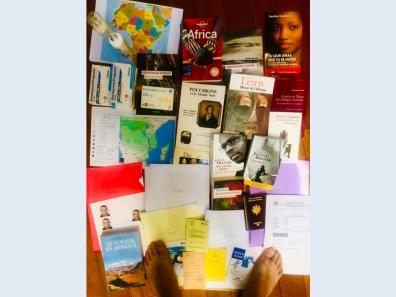
A commission from the Inalco Foundation for an African journey! Joy and questions. Oriental Languages? At 2 rue de Lille, I'm only recognized by a few, and even then it's for my stint in Chinese language and civilization! So, what's next? Will I have to return to the vocabulary of the company, thirty-five years of my existence? The service proposal, the delivery injunction, the deadlines to be met, the back-planning? Could I continue to call my new life a whole: living, reading, writing? When I'm writing, I'm off the hook, so what? Will I have to abandon Sylvain Tesson's "s'abandonner à vivre"? Write to order and travel under surveillance? Travelling writer? A traveler, certainly, but a writer? Today, authors are all the rage. Author under pressure, forbidden to run out of inspiration? No! A strengthened and inspired author! A commission that touches and compels me.
Post 2/12: D-Day, a flea on a plane

At check-in, when asked the question aisle or cabin, so many passengers opt for the aisle...being able to get up to pee without disturbing your neighbor? For me, it's the window. As long as we're not asked to lower the curtains. As soon as the Air Portugal flight from Lisbon to Maputo takes off, my little window on the sky plunges me into the journey. I'm like a child, playing with fear, visualizing myself falling out of the plane. Will the Mediterranean absorb my gravitationally-caught body without damage? Wars can't be seen from the sky. On D-Day of my African trip, the pilot announces that we'll avoid flying over Abdourahamane Tchiani's new Niger. As northern Mali and Burkina Faso have long been out of the question, the flight has been extended by two hours. With its three hundred and sixty-two square meters of wing area, my Airbus A330 is my first piece of Mozambique. Here we see Mozambican executives on holiday, executive women in blouses and Prince of Wales jackets, spoiled children in designer sweatshirts returning from their winter vacations in Europe and, symmetrically, representatives of the Lisbon middle class preparing to spend August in the former colony. The ads are in Portuguese, as they were before 1975. I don't speak the language, nor Spanish, but this time my Italian is of no help. With my gaze on the wing of the plane, which is just catching the light of a sun that has long since disappeared, I think about the blurred nature of my African project. In China I'm at home, in Africa I'm lost. My visa applications take me from a once Portuguese Africa to its German sister, its English and Belgian cousins: Mozambique, Zimbabwe, Malawi, Tanzania, Uganda and Rwanda. Maybe, maybe not, I'll decide at each stage. But isn't everything Chinese over there now? So I'll be at home? See. And the wild animals? Will I be able to see them without the image and trophy hunters? Well, the representatives of luxury tourism will interest me like crocodiles and lions. For now, I'm as excited as a flea.
Post 3/12: Day D+2, Africa han, Assimil method

Four years Lynn and Qichang have been teachers at the Maputo Confucius Institute. I interrupt them in their Portuguese cramming, it's hard conjugations, Chinese is much easier. But the experience is unforgettable for this city couple. While it didn't cause much of a scare in Maputo, the coronavirus turned the lives of the two teachers upside down. When rumors about the origin of the virus surfaced, all eyes were on them and on the two-thousand Chinese living in the city. Returning home was impossible, so they had to get used to it. Yassine, co-director of the program, is proud of the six Mozambicans who have become Chinese teachers after having been his pupils. One day, the Chinese machine will be self-sufficient, and Xi's "experts" will no longer need to travel to Africa. The hundred former students will become two hundred, then a thousand, and they're already swarming into the Chinese SOEs established in the city, the State Owned Enterprises with their start-up look, spearheading the Mandarin conquest of the continent, in competition with the Americans and the Russians. Yassine sighs at the prospect of seeing his most brilliant students leave before the end of their fourth year. Without their diplomas, they get jobs and attractive salaries. On the China Africa Business Council website, an edifying slogan to attract them: Respect culture, Combine generosity and profit, Win-win cooperation. Already sixty-one Confucius Centers in Africa. With their sixty-three Instituts Français, the Gauls will soon be doubled. Will Mozambique go further? in Uganda, Chinese is compulsory at secondary school. Remember "Wolf Warrior 2", a cult film from my idolized China, featuring a People's Liberation Army soldier in trouble in Africa, and its edifying end credits: "Citizens of the People's Republic of China: if you are in danger abroad, don't despair! Don't forget that your country is always ready to help!". Lynn and Qichang have nothing to fear.
Post 4/12: Day D+9, migration

At D+3, on the move! From Maputo, the first track is rail-bound. Disappointingly, it's not possible to buy tickets as far as Chicualacuala, on the Zimbabwean border: the previous train has derailed, so we'll probably have to get off halfway. However, in the night, everything is back in order (how?), and we can snooze until morning, nineteen hours of twisting and turning at less than thirty kilometers an hour. But Emmerson Mnangagwa's Zimbabwe will have none of our strange team. Is it our two computers, my travelling companion Boris Soutzo's and mine, that raise questions? the thirty-two years that separate us? his work as a filmmaker? impossible, he said he was a student. After a two-hour wait, "You're a journalist from France 24!" the Zimbabwean temple guard triumphantly asserts. And he proves it! On his smartphone, the Facebook portrait of a certain Eric Jean Bernard. These are indeed my first names, but my surname is missing... But then, election time is no time for taking risks. Back to the other side of the fence, to the Mozambicans...who are reluctant to take us back. Later, freed from our emotions, we spend a drunken evening in a bar, writing a beautiful page of life. The very next day, to get out of this poorly served destination, we had to make our way through a succession of overcrowded minibuses, trucks overflowing with migrants of varying degrees of motivation, air-conditioned buses, three-wheelers, private cars and even motorcycles... At an average speed of just over thirty kilometers an hour, we covered two thousand kilometers of dirt and asphalt, all of it just as bad. Chicualacuala-Mapai-Massangena-Chimoio-Tete-Monkey Bay: in five exhausting days, we reach the land of the song "Malawi 2063, we are all in! My foggy mind confuses Malawians and Malaysians: Blantyre, the country's second-largest city, has something of the Kuala Lumpur of the '80s about it, and both countries have had their "Vision 2020". Both failed, hence the second Malawian attempt to give itself forty-three more years to reach nirvana.
Post 5/12: Day D+14, coasting, stalling

On board the MV Ilala, a fallen star of the Fifties just emerging from a mysterious facelift. The mechanics have been given a facelift, but the bunk drawers have remained providential havens for cockroaches. As long as they keep the bedbugs at bay... A few dozen euros bought three days' coastal cruising for two on Lake Malawi. With barely more than three dollars a day per inhabitant (a figure lower than in any other country I've visited), Malawi is the sixth poorest country in the world. In our first-class cabin, I try my hand at writing, but my concentration is shattered by the rolling motion. Protected from the incessant engine noise and screams by earplugs, I wander into unknown territory, trying to hold on to what remains of my lucidity. Tender, heady and dark, Africa has captured me like so many others before me. And I'm willing. For those who sprinkle it into their existence, the journey needs no explanation. In Saisons du voyage, Cédric Gras tries: "Today, I can say with greater certainty that I'm leaving, because I'm bored". But in Equatoria, Patrick Deville: "The fantastic thing about this life is that, whatever you do, whether you're Jim or someone else, you always end up bored pretty quickly. Go figure. Hunkered down on the three decks, wearing their Glénans bonnets and windbreakers, the five hundred passengers try to keep warm from the lake breeze. The chambo fish served in the saloon isn't fresh, so Boris and I fall back on our packets of instant Chinese soup. Night and day at the ports of call, the hubbub becomes a howl as we transfer in and out of the Ilala's two longboats with the help of the villagers' skiffs. Our TGV runs four hours and fifteen minutes late. On the upper deck, a poet talks to me about his business affairs. It's Arthur Rimbaud, but I can't save him from his melancholy. We're no longer the only white people, for the first time since the start of the voyage.
Post 6/12: D+18, the circus of the Bigs
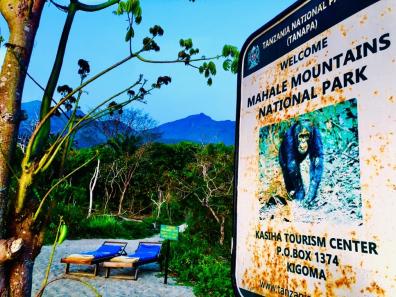
On the map of ubiquitous tourism, Africa claimed to be the continent of animals. When I was younger, I went to the parks of South Africa in search of the elephant Babar and the lion Leo that had lulled my childhood. From the back seat of a four-wheel drive, I would scan the savannah, occasionally catching a fleeting glimpse of one of the Big Five, a controlled appellation that took me back to my career in the same business (the five multinational consulting firms were later reduced to four, so in terms of savagery I couldn't tell the Big Four from the Big Five). More recently, posts from my Facebook "friends" had informed me that the photo safari business had become professionalized, that giraffes, elephants, buffaloes, lions and leopards could all be seen up close in the parks in just a few days' sharp service. But out there? For thousands of kilometers, with the exception of a cobra quietly crossing the track in front of our minibus, Boris and I didn't come across a single local animal icon. It took one more park, Katavi in Tanzania, which we reached on D+16, to catch a glimpse of five giraffes and an elephant from the window of a bus. Then another, Mahale, where we took up residence, to observe some of the seventy chimpanzees duly referenced by a group of Japanese researchers, a tenth of the total number. For half a century, humans and apes have lived side by side without hurting each other, the former giving the latter improbable names: the two females "Pafy" and "Jean", walking on the backs of their latest offspring, let themselves be photographed (very) closely. In 1988, the "M" tribe eliminated the less numerous "K" tribe. No survivors. In 2011, the enraged "M "s, both male and female, got rid of their dictator Pim by beating him with a stick (an Alpha male who raped and beat indiscriminately - nothing to do with Pyongyang's Kim, that one stands his ground). Since then, peace has settled in, and visitors can be charged handsomely to bring back photographic trophies and enthusiastic stories.
Post 7/12: D+ 23, la grande récré
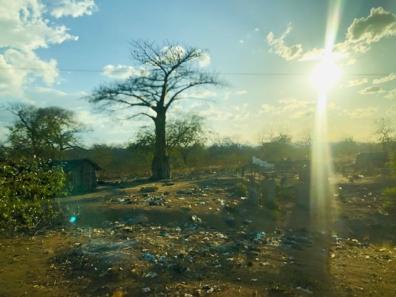
Barely touched from Monkey Bay, Makanjira, Chipoka, Nkhota kota, Likoma, Chizumulu, Nkhata Bay, Usisya, Rurwe, Tcharo, Mlowe, all stopovers on the MV Ilala, and Chilumba where we disembarked. Then another series of towns, Karonga, Songwe, the border post between Malawi and Tanzania, Mbeya, Sumbawanga. Then Katavi Park, Mpenda and Kapanga, where, having run out of buses, we hailed two motorcycles and, clinging on to our budding pilots, raced over one hundred and thirty kilometers of track to Mahale Park. These dozens of hours spent in the noise and dust, crushed by the bumps, leave time for daydreaming and sometimes reflection. As if on cue, the question of sustainable development arose, my livelihood for years. Before leaving, I had read that Uganda was at the cutting edge of ecological activism. A misstep inspired by the recent anti-LGBT clampdown, I won't have the energy to pay him a visit. Dixon Bahandagira wants to plant millions of trees, Evelyn Acham and her friend Vanessa Nakate fight for climate and racial justice. I'd have to talk to them about their struggles, and others that slap me in the face. Commonplace: Africa is a dumping ground (the world is a dumping ground). The plastic bag of the Parisian bobo (me) is easy to replace with paper, but here? How many lives have been saved by the polyethylene bag, unbeatable for insulation and preservation? What do you think? We'd have to organize collection in the countless litter-ridden villages we passed through. There's such a thing as World Garbage Collection Day, and that would be my first ecological battle, so that water doesn't rot and disease doesn't spread. Precisely, here in Tanzania, the government launched its "national waste management strategy" in 2018. Peter, our ranger, proudly explains that once a week, the late President John Magufuli enjoined his compatriots to collect waste all over the country. On that day, no other activity was allowed until eleven o'clock in the morning-no school, no work, blast the plastic!
Post 8/12 Day D+26, the polyglot Doctor
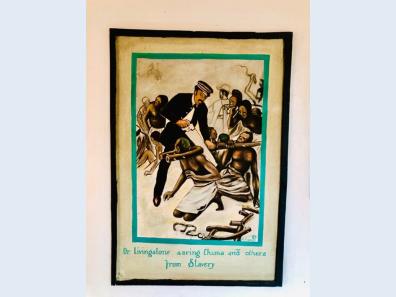
Since our arrival in Mahale, long moments of meditation on the shores of Lake Tanganyika, longed for for years. After a two-hundred-kilometre motorcycle ride, we stayed on the shores of this lake, the longest in the world, first in Kigoma, Tanzania, then, after two more trips, in Mugotora and Bujumbura, Burundi. For those looking for a museum experience, this region is not the richest. In Ujiji, the small Dr. Livingstone Museum is a must-see. You'll be bowled over by the papier-mâché replica to scale of two protagonists of the African conquest, Henry Morton Stanley, a thirty-year-old American, and David Livingston, a sixty-five-year-old Englishman who had been missing for five years. Stanley is said to have used a slightly cavalier phrase: "Doctor Livingstone, I presume?", to which Livingstone replied: "Yes, that is my name". Touchingly naive, a series of gouache paintings illustrate Livingston's feats of arms, as he was profoundly human and in love with Africa, which was in no way the case for Stanley. I particularly like the one depicting the Doctor operating an imposing wood saw to free slaves from their shackles. Referring Christians, Muslims and African animists to their responsibilities as slavers, explanatory panels give a strange nod to the human trade: "Positive impacts of ivory and slave trade include the architectural heritage found among cities, towns and centers on the slave routes which are now important tourist attractions"... Tourism, again, justifies slavery... this board will have to be revised in the age of interplanetary wokism. Livingston mastered several African languages and would undoubtedly have made a brilliant student of the O' languages. As for me, after several weeks on the road, Africa continues to intimidate me: I still don't speak a word of Swahili. Yes, one, learned in the RER before leaving: "Merci!", "Shukrani!", easy, almost Arabic.
Post 9/12: D+29, tourists

At the Tanganyika Blue Bay Resort, the only pinzutus of our kind, Boris and I mingle with wealthy families from Bujumbura who've come to spend a few days by the lake. The Europeans who usually flock to these places are on vacation back home. Confident of our ability to stop time, we sacrifice ourselves to the great relaxation of minds and bodies. Real tourists, that's certainly the category Burundi's government agencies can count us in. Unlike ritual dances to the royal drum, farniente is not included on the Representative List of the Intangible Cultural Heritage of Humanity, but it is an activity of unfathomable vanity and sweetness after four weeks of wandering. "Beware of hippos": a sign on the beach adds to the exoticism of the place, and I try to convince myself that it hasn't just been planted there by the hotel management to brush us off, to arouse the call of savagery. As for the crocodiles, "not before five o'clock", the hotel receptionist confidently asserts in a French barely too polished to pass for a Brussels girl. She pretends not to realize the enormity of the threat; I can't tell bacon from pigs. Tourism is a godsend for this poorest country on the planet, if per capita GDP is anything to go by. Admittedly, we've noticed on the streets, beyond the compound walls, that the clothes are less washed and ironed than in neighboring Tanzania, but the young people play and smile just as much, they have the power - the country's average age is sixteen. I don't want to think that I've understood everything about the standard of living in Burundi, but what sense can I make of the statistics of the World Bank and the International Monetary Fund? At night, in the hotel bar, the party is in full swing, and I let myself be lured into savoring European beers in place of the local banana beers: too local, in fact, they're not on offer.
Post 10/12, D+33, Miguel Shema doesn't like milk

Miguel Shema doesn't like milk, the drink distributed to children in times of war. French, he tries to love his Rwanda, even if it is the land of milk. We promised ourselves a trip together. Now I'm in Kigali and he's in Iasi, Romania's second largest city, where he's studying medicine. The story of his family haunts me; there's no word for it. Before setting off, I asked him to tell me more. "Luckily you weren't living in Rwanda at the time, you look so Tutsi, you'd have been killed", since childhood Miguel has lived with this sentence from his father. Every April 7th, whether they're in school or not, whether they feel like it or not, Miguel's family goes to Médecins du Monde headquarters in Paris to commemorate the genocide of the Tutsis in Rwanda, and watch out for children who don't listen to the remembrance speech. A few years ago, he tells me: "As children on vacation in Kigali, we'd gone to a village and learned from I don't know who that my maternal grandmother and grandfather had been crucified." Much later, he adds: "I don't know if I ever confronted my mother with this. He concentrates, remembers again: one day, a family friend visits them, exclaims that Miguel's brother looks so much like Innocent. That's how Miguel and his siblings learned about Uncle Innocent, his mother's missing brother. Two others have also disappeared. Then there are Miguel's father's three siblings - he can't remember how he knew about them. Six aunts and uncles, two grandparents. During the right-wing primary in autumn 2016, he was just sixteen, writing for the Bondy Blog, calling out candidate Alain Juppé, who was getting angry. Today, at twenty-three, Miguel has taken up the subject of genocide, giving interviews. "We must not settle for crumbs when it comes to apologies. But that's not enough for him. One day," he sighs, "I'd like to be able to talk to my parents and not just to journalists. Miguel tries to love Rwanda as he tries to love France.
Post 11/12: D+35, le voyage 3.0
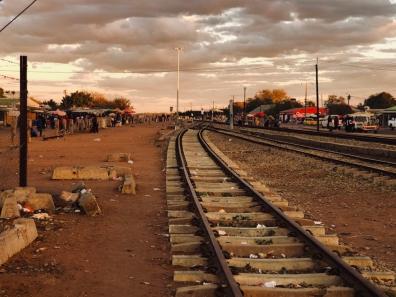
The world was rushing into planes, an honest man had to fly through it. And then. The climate crisis and that of the nasty virus have given the Ys and Zs other wings: with their butts nailed to the village square, they're summoning the boomers to stay put. I'd rather die. I've been practising the Jancovici carbon balance method for years, I know the place of air travel in the overall picture - at worst four percent of greenhouse gas emissions - and I'm saddened to have to justify the happiness of the traveller. Let's make the planet happy again first and foremost! Sylvain Tesson contrasts travel and tourism. Yes, wise adventure travel, tourism, ambulatory games in an unknown land. I reread Marin de Viry's well-spoken pages (Tous touristes) and convinced myself - without too many illusions - that my own journey is not tourism: "Why do we go?... Because social constraint acts. We go as we give in to pressure". I put the pressure on myself, travelled to over a hundred countries, suffered from bad weather and boredom, enjoyed abandonment, got lost with my guide without GPS at the summit of Mont-Blanc. Today, with a power socket to recharge my iPhone, a power bank and a local SIM card (as an exception, I refuse to use them and, when no wifi is available, I manage the worries of my family who have no news), the traveler mimics the tourist. And the travel writer is not to be outdone, with his Macbook Pro hidden in the inside pocket of his backpack. Does Tesson have his maps mailed out in hard copy? Everywhere in the world, with MAPS.ME, Google Maps and Strava I carve out my route, with Tripadvisor, Booking.com, Airbnb and Expedia book a room to show off to immigration officials or for real, with Deepl and Google Translate dialogue with my encounters, with Instagram, Facebook, X and WhatsApp initiate an eternal dialogue with those who deserve it. Cédric Gras, this "geographer" as his traveling companion and false friend Sylvain Tesson scornfully calls him, and with him the family of travel writers, no longer pretend to be disconnected.
Post 12/12: D+ 37, for Cédric Gras
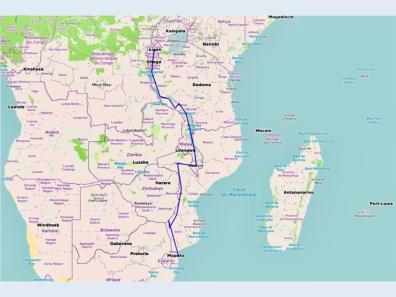
On the tarmac at Kigali airport, the plane to Paris via Cairo, the impatience of the return journey. Reading memory: back from his African journey, melancholy takes hold (as it often does) of Michel Leiris: "Worries about the life we'll have to take up again. The stupid life of the metropolis. The narrow life of the French! And to think there are people suffering from homesickness...". My body irrigated by the sap of a baobab tree, my mind soon free of planning, my spleen relegated to the rank of my Baudelairian studies, I'm happy if it exists. Boris is in tune. Our friendship has lasted the distance, its five thousand kilometers, its submission to the randomness of a predefined route between two capitals, Maputo and Kigali, its accidents along the way, its happy surprises, its breathless encounters that make WhatsApp heat up, Paulo selling train tickets, Francis and Sebastian drunken companions from Chicualacuala, Nelio the only cab in Mapai, Luis, a lost driver from Massangena, Enock, a lodge manager in Monkey Bay, Jordan, a fisherman from Lake Malawi in search of funding for his son, Ivo, a gracious one-man band who loves to party, Peter, a ranger who knows everything about the flora and fauna of Mahale, Omar, his charming intern studying French, and so many others who never got past the stage of exchanging WhatsApp addresses. You never meet as many people as when you travel alone. Yet many of the world's best-known travel writers were accompanied: Marco Polo ("Le devisement du monde", 1298) by his father and uncle, Nicolas Bouvier ("L'usage du monde", 1963) by photographer and artist Thierry Vernet, Olivier Rolin ("L'invention du monde", 1993) perhaps not by Jane Birkin, his latest companion, François-Henri Désérable ("L'usure d'un monde", 2023) by a certain Quentin, at least "on the road to Che", Sylvain Tesson by Cédric Gras. I admire the prose of these two, but prefer them apart. It's time to conclude, and it's to Cédric Gras that I gratefully dedicate this tale in twelve Billets du hasard.
Contact: View e-mail
Website: https://www.tanguypiole.com